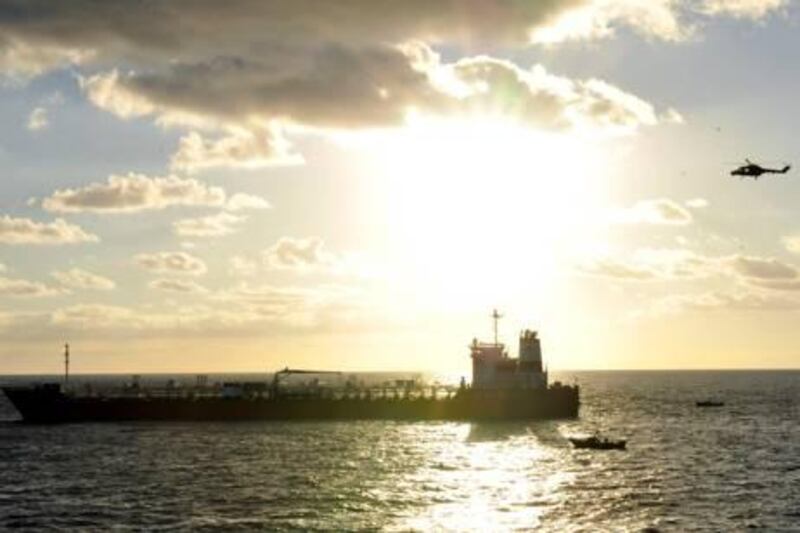DUBAI // The UAE Shipping Association (UAESA) has reversed course to back the use of private security guards aboard commercial vessels as the best way to combat increasingly aggressive Somali pirates.
The U-turn comes as the shipping industry worldwide reconsiders its longtime opposition to carrying weapons at sea. Over the past year, pirate presence has spread across the Indian Ocean. Ransom demands are rising, and hostages are being held captive longer.
Last week, pirates killed four American yachtsmen whom they had taken hostage.
"We don't feel protected by the international navies, so we need to take matters into our own hands," said Scott Jones, first vice president of the UAESA, the leading industry body in the nation. "There is still no vessel that has armed guards on board that has been taken. It seems to be the only way we can feel relatively certain," he said.
That stance would hold for as long as the problem persisted, the organisation said in an announcement earlier this month.
"Until an international solution resolving the governance of Somalia is accomplished, the UAESA will support the stationing of trained professional armed security aboard vessels."
Dubai port authorities have implemented "clearance procedures" to allow armed guards, it said.
Since many ports around the world ban weapons, many authorities have had to amend or clarify their policies to allow private security escorts to enter.
In some countries, the authorities meet the vessel several miles out and confiscate their weapons. In Dubai, ships will be required to gain permission for armed escorts and lock up their weapons before entering the port, said Mr Jones.
The Dubai Ports Authority could not be reached for comment, while the ports operator DP World declined to comment.
Earlier this month, the International Chamber of Shipping offered support for the use of armed escorts aboard ships.
"In view of the current crisis in the Indian Ocean ... ship operators must be able to retain all possible options available to deter attacks and defend their crews against piracy.
"Many shipping companies have concluded that arming ships is a necessary alternative to avoiding the Indian Ocean completely," said the ICS, which represents 80 per cent of commercial vessels worldwide, according to its website.
Somali pirates are believed to be in control of 33 vessels and 712 hostages, the International Maritime Bureau said in its latest report. This year alone they are thought to have seized 11 vessels and 224 hostages.
Recent events - in particular the killing of the American yachters - have raised fears of escalating violence by pirates.
Until now, pirates have mostly used hostages as bargaining tools to demand higher ransoms. But after eight pirates were killed during the rescue of a hijacked tanker by a South Korean warship in January, pirates have threatened in future to kill any South Korean hostages.
Armed escorts are increasingly viewed as the safest defence against pirates, but the option comes with drawbacks. "Everybody has concerns," said Mr Jones.
About a quarter of the UAESA board was against the new stance, which supports shipowners who use armed guards but does not urge or require them to do so, he said.
The nascent maritime security industry remains unregulated, even as firms have mushroomed in the past year to capture growing demand. "There are quite a few 'new boys' and we don't really know what their procedures are for vetting their people, what their standard operating procedure would be, what their rules of force would be," said Tim Stear, the regional general manager of Control Risks, which offers armed guards at sea.
Liability remained unclear in the case of injury or death. No case had yet been brought of security guards firing on innocent civilians, and the issues remain untested, he said.
"Nobody can promise - or should promise - that they've got all the answers," he said.






